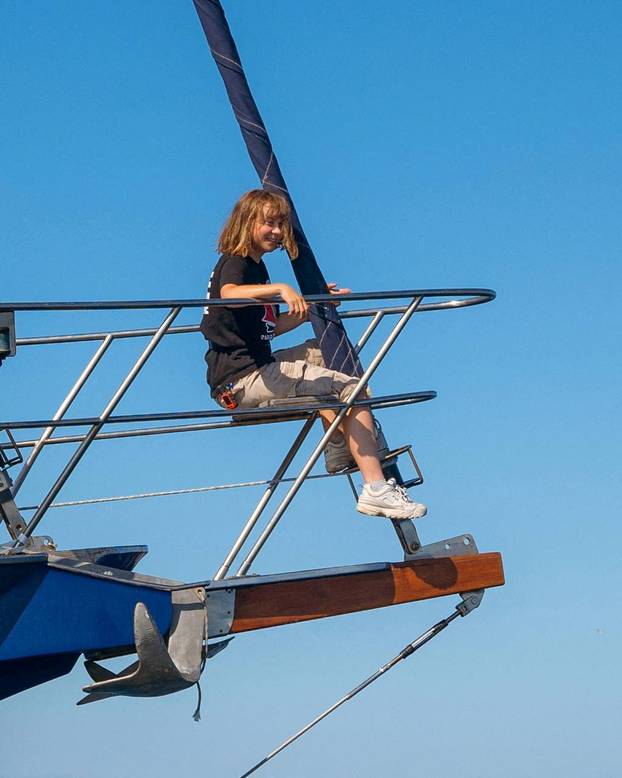SHIPS SHOW TIGHES ON THE GREAT TO BE HAVE: ‘If you adapt too much, you will lose yourself, your own core’
/s3/static.nrc.nl/images/gn4/stripped/data129873921-0f6bf7.jpg|https://images.nrc.nl/UmozocGgRMSY4wxl2inaM_z8tWY=/1920x/filters:no_upscale()/s3/static.nrc.nl/images/gn4/stripped/data129873921-0f6bf7.jpg|https://images.nrc.nl/sK1fHs9yHC32aukwYUxBYtTJuWY=/5760x/filters:no_upscale()/s3/static.nrc.nl/images/gn4/stripped/data129873921-0f6bf7.jpg)
A crossing from the Turkish coast, ten kilometers in a rubber boat in the middle of the night. Ships of the Coast Guard as shadows circling around it. Beach. Europe! Refugee camp. And then, the next day, when Bram Tjaden and Wendela Dijckmeester looked at them, they saw …
« Discharge. » I’m safe! »
« Dissociation. »
« Alienation. »
« Fear, also. »
The realization that from now on they are a migrant on strange soil. One of thousands.
Tjaden and Dijckmeester worked in the refugee camp at Lesbos for two months – a few years ago. He (72) as a doctor, she (68) as a system therapist and yoga teacher. The couple was seen a bit among the care providers as the father and mother of the group. All those young people from all over Europe who, just like them, had chosen to help refugees for a few months in their lives, « of course also because of the adventure. »
The camp on Lesbos is on the coast so it is constantly blowing. All those tents, chattering tent sail. Long lines for eating. Single youngsters and entire families packed. Tjaden and Dijckmeester worked in a converted container and everyone could knock on the door. Neglected shot wounds. Cut wounds. Comatose young people who numb themselves with alcohol and drugs. Anxiety complaints. Panic complaints. Depression. Aggression. « There just played … everything. »
Where do you start?
Tjaden: « You shouldn’t see it as fundamental help. But you can – and you learn that – always do something within the possibilities. » An ointment against a skin infection. Trying to make appointments with the kitchen for someone with a diet. Breathing exercises, when someone comes in hyperventilating. Dijckmeester: « So that they can do it themselves afterwards, in the tent. »
The two tell about it at the dining table in Santpoort, in a house with a spacious garden in a beautiful neighborhood, involved after the Lesbos adventure. So spacious that a Turkish couple has been living in the garden house for eight months that fled after the failed coup that Gülen was charged in 2016. And before that a young man on his own, also refugee. Posted via Take Care BNB, a foundation that links status holders to Dutch families who have a room available. To bridge the time that they would otherwise wait for a home in an AZC. « They can get used to the Dutch language and culture, » says Dijckmeester, who works as a mediator for the foundation. « And above all: to take a break, a time-out. »
Waiting can be tough and adjust them. Tjaden and Dijckmeester see this at the three hundred asylum seekers on the reception boat in Velsen-Noord, where they work as a doctor and activity supervisor a few days a week. And they also recognize it from their own lives, as a child of an expat (he) and from a pastor (she). Moving each time. Being the other every time. « And then it is careful, » says Tjaden, « that you don’t lose yourself a little. »
‘Europe!’ And via wanderings to the Netherlands. Ter Apel. First conversation with the immigration and naturalization service. Waiting for the second interview in an AZC. Transfer to another AZC. Again transfer. Again. Again. And then, a year and a half later, the second interview in which it is decided whether they can stay. The result, also waiting for months. And then often years of waiting in the AZC a status holder is eligible for a home.
« They all had not calculated in advance, » says Tjaden. « The crossing was often heavy enough. They didn’t expect that … »
What does a person wait?
« Different reactions, » says Dijckmeester. « It is also a bit of how you were baked. » If the couple walks around on the asylum boat in Velsen-Noord, they see some refugees seizing every activity and going to the gym and immediately follow an online language course. « Everywhere that murmur: » I am, you are, he is. » But there are also refugees who eat extremely much. Or extremely little. Get a short fuse. Become lethargic. All day on the phone. Barely get out of bed. And many of those behaviors, Tjaden says, can be traced to a stress reaction of the body. « Freeze, Fight, Flight. »
Which physical complaints do you see?
Tjaden: “Well, one boy had suffered pneumonia and he did not pass. It hit one to the other. No more eating. Hypochondric thoughts. And of course you also have many refugees with a post-traumatic stress disorder, sustained in their home country or on flight. But due to all the changes and uncertainty-they remain in the Topmus of the stressful three three three three three three three three three-three three-three three-three-three three-three three-three-three three-three-three-three-three-three-three-wayed three-three-wayed three-way thesis three-three three-three three-three-three-three-three-way three-three-way theater three-three-three stresses. Easily recovers. ”
Often, they see, it is not the body but the mind that requires care. Only, to the home front, refugees would like to let them know that they are going with them. And not all care is reimbursed by insurers. And in some countries, psychological aid has less prestige than physical. So Tjaden often tries to emphasize the physical influence of stress on the body. On the nervous system, the muscles. « You see a lot of neck complaints, back complaints, abdominal complaints, blockages. »
And he regularly refers to his wife, who organizes activities on the ship such as Yoga, a singing evening, a chess tournament, trips to the dunes or dancing in Beverwijk. « Are they beautifully dressed, the women, » says Dijckmeester. « Building small parties, that’s what it’s all about. Looking for moments to go loose in a different environment. Away from the ship. »
/s3/static.nrc.nl/images/gn4/stripped/data129873912-e76b4d.jpg|https://images.nrc.nl/_V9bmNGJ8eEF4ib0Vgaru4v7Z1Q=/1920x/filters:no_upscale()/s3/static.nrc.nl/images/gn4/stripped/data129873912-e76b4d.jpg|https://images.nrc.nl/gp9moYlkjSn1csnP1zP1bVlD4TY=/5760x/filters:no_upscale()/s3/static.nrc.nl/images/gn4/stripped/data129873912-e76b4d.jpg)
Not that the circumstances on such an asylum boat are so bad. They clean and cook for them. But it is precisely that lack of autonomy, in combination with waiting, each other’s lip, reinforces the feeling of alienation.
And when they come to live here in the garden house?
« Sleeping! You notice that they are very, very tired. They really have to recover, » says Tjaden. « That took a few months with all the residents we had. That is the first phase. »
Dijckmeester: « The man of the couple who now lives has been locked up as a political prisoner for four years. Then they stayed in several asylum seekers’ centers, where they are married, and now they really live together for the first time. They have never had much privacy. »
The world is bigger than you. Both have been given that. The ‘social’ is simply ‘deeply ingrained,’ says Dijckmeester as the daughter of a pastor.
« We are still » – Tjaden laughs – « Real idealists! »
Dijckmeester: « From those years of six-activists! »
They say it a bit stunned, because the current political climate is not exactly involved. In their neighborhood they are just about the only ones with a poster of a peace pigeon behind the window – Peace Now – and in the discussion that is currently raging about the arrival of an AZC, they are a minority as an in favor. « Together for our own, that is a bit of the tenor in the Netherlands. » Although they also do not want to judge the position of others because the discussion about asylum seekers – « How far do you open the door as a society? » – Is also a difficult one.
But what they now realize: that the expectations that Dutch society has of newcomers are not always realistic.
Tjaden: « We had a foster child from Sierra Leone. A boy of sixteen who, as a stowaway, had only fled a boat from the Diamond War. He stayed with us in the weekends and he had a phase in which he tried very hard to go all the way in the Western values. Dutch girlfriend, Dutch football team. And then … »
Dijckmeester: “For three weeks he stood at a bus stop on the border with Sierra Leone, hoping to meet family from his home country. And when that was successful, he made the choice to become Muslim again. Strict Orthodox. If we women no longer touch him. That was just as difficult, especially for our two roofs. And has found his family a bride for him.
Can you understand that?
« Survival strategy, » says Dijckmeester. « For a moment he wanted to be very Dutch. He wanted to do the way everyone does here. Be like us. But that’s just a small layer. »
« An adjustment layer, » Tjaden nods. « There are old values and norms. »
Tjaden should think of his own youth. Born in Damascus as the son of a KLM representative. Then lived in Hong Kong and Germany, among others, and at the age of twelve to the Netherlands. Laughing: « I see myself sitting in that class again: the only one with a tie, and getting up to sing the Wilhelmus. Because I thought it was heard. » He recognizes the same urge to adapt, want to belong to it with many newcomers. « But adjusting is also a danger. Because if you do that too much, you will lose yourself. Your own core. »
In the Netherlands we would like newcomers to integrate.
Dijckmeester: « You can expect them to learn the language. And also that they adapt to the legal system. That seems important to me. But if ‘integration’ means that they also take over our values and culture, then … »
« That won’t be him, » says Tjaden. « And personally that doesn’t appeal to me at all. Isn’t it much more interesting and exciting to look at each other’s differences? How does the other person live? What can we learn from it? »
Dijckmeester laughs. « Do you remember when I broke my ankle? The couple in our garden house had heard that we are huge individualists in the West. No friends. Hardly any family. They were Verbáásd that there was a visit. »
Dijckmeester was constantly getting snacks from the garden house – « they could cook here for the first time ». That was when that first phase of fatigue was over and there was room for rapprochement with the refugees. They met each other’s friends, went for a walk together in the dunes and at the Van Gogh Museum in Amsterdam – « they were looking for ten minutes for each painting », « from » the almond blossom « they still purchased a poster ». And with the previous occupant, a single boy, Muslim, they celebrated Christmas together with the grandchildren. « He played the songs on the guitar. »
« Maybe a hopeless idealistic position, » says Tjaden, « but instead of » integrating « I would rather see that society strives for » dynamize « . »
/s3/static.nrc.nl/images/gn4/stripped/data129873903-925f00.jpg|https://images.nrc.nl/FK-hvWWf3lPqZfhmazY55Bv_q_U=/1920x/filters:no_upscale()/s3/static.nrc.nl/images/gn4/stripped/data129873903-925f00.jpg|https://images.nrc.nl/DjHGRLmQQJfYuTpbtd5BQcxeeTk=/5760x/filters:no_upscale()/s3/static.nrc.nl/images/gn4/stripped/data129873903-925f00.jpg)
How are your foster son now?
Dijckmeester: « That has been very exciting whether we would not lose each other. But he just needed it, that extreme period. We talked a lot about shared values. Compassion. That spoke to him. He recognized that from the Koran. And now he is 35 and moderate Muslim. He lives with his family in Belgium. »

:format(webp)/s3/static.nrc.nl/images/gn4/stripped/data132512191-bf7b93.jpg)
/s3/static.nrc.nl/images/gn4/data133305174-ec8c91.jpg)




